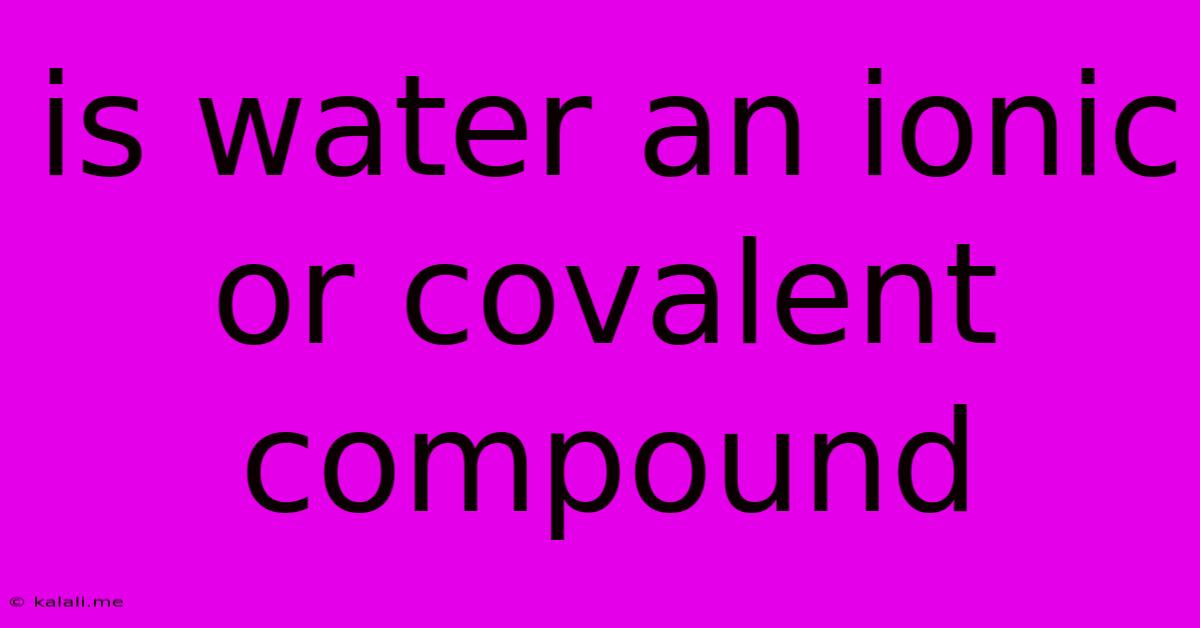Is Water An Ionic Or Covalent Compound
Kalali
Jun 01, 2025 · 3 min read

Table of Contents
Is Water an Ionic or Covalent Compound? Understanding Water's Molecular Bonds
Water (H₂O), the elixir of life, is a fascinating substance with unique properties that are directly linked to its molecular structure. A common question that arises when studying chemistry is: is water an ionic or covalent compound? The answer lies in understanding the nature of the bonds that hold its atoms together. This article will delve into the details, explaining why water is considered a covalent compound and exploring the implications of this bonding type.
Understanding Ionic and Covalent Bonds
Before classifying water, let's define the two main types of chemical bonds:
-
Ionic bonds: These bonds form when one atom donates an electron to another atom, creating ions with opposite charges that attract each other. This usually occurs between a metal and a nonmetal, with a significant difference in electronegativity. Examples include sodium chloride (NaCl) and magnesium oxide (MgO).
-
Covalent bonds: These bonds form when atoms share electrons to achieve a stable electron configuration. This often occurs between nonmetals with similar electronegativities. Examples include methane (CH₄) and carbon dioxide (CO₂).
Water's Covalent Nature
Water is composed of two hydrogen atoms and one oxygen atom. Oxygen is significantly more electronegative than hydrogen. While this difference in electronegativity might initially suggest an ionic bond, the electrons aren't completely transferred from hydrogen to oxygen. Instead, the oxygen atom strongly attracts the shared electrons, resulting in a polar covalent bond.
Polar Covalent Bonds in Water
The unequal sharing of electrons creates a slight negative charge (δ-) on the oxygen atom and slight positive charges (δ+) on the hydrogen atoms. This uneven distribution of charge is what makes water a polar molecule, possessing a dipole moment. This polarity is crucial for many of water's unique properties, such as its high boiling point, surface tension, and ability to act as a solvent for many ionic and polar substances.
Why Water Isn't Ionic
The electronegativity difference between oxygen and hydrogen, while significant, isn't large enough to completely transfer electrons and form ions. If water were ionic, it would exist as H⁺ and O²⁻ ions in its pure form. However, experimental evidence, including its low electrical conductivity in its pure state, shows this isn't the case. The shared electrons, while unevenly distributed, remain within the molecule, characterizing the bond as covalent.
Implications of Water's Covalent Nature
The covalent nature of water's bonds has profound consequences for life as we know it:
- Solvent Properties: Water's polarity allows it to dissolve many ionic compounds and polar molecules, making it an excellent solvent for biological processes.
- High Specific Heat Capacity: The strong hydrogen bonds between water molecules (a consequence of its polarity) contribute to its high specific heat capacity, enabling it to moderate temperature fluctuations and maintain stable environments.
- Hydrogen Bonding: The slightly positive hydrogen atoms of one water molecule are attracted to the slightly negative oxygen atoms of other water molecules, forming hydrogen bonds. These bonds are crucial for many biological structures and functions.
In conclusion, water is a covalent compound, specifically characterized by polar covalent bonds. The unequal sharing of electrons and the resulting polarity are fundamental to understanding water's unique properties and its crucial role in sustaining life. The misconception that it's ionic stems from a misunderstanding of the nuances of electronegativity and bond formation.
Latest Posts
Latest Posts
-
Farming A Man Of Your Talents
Jun 02, 2025
-
Business In The Front Party In Back
Jun 02, 2025
-
All I Know Is My Electric Drill Floated
Jun 02, 2025
-
What To Do After Killing First Mechanical Boss
Jun 02, 2025
-
Do Pans Need A Higher Or Lower Specific Heat
Jun 02, 2025
Related Post
Thank you for visiting our website which covers about Is Water An Ionic Or Covalent Compound . We hope the information provided has been useful to you. Feel free to contact us if you have any questions or need further assistance. See you next time and don't miss to bookmark.